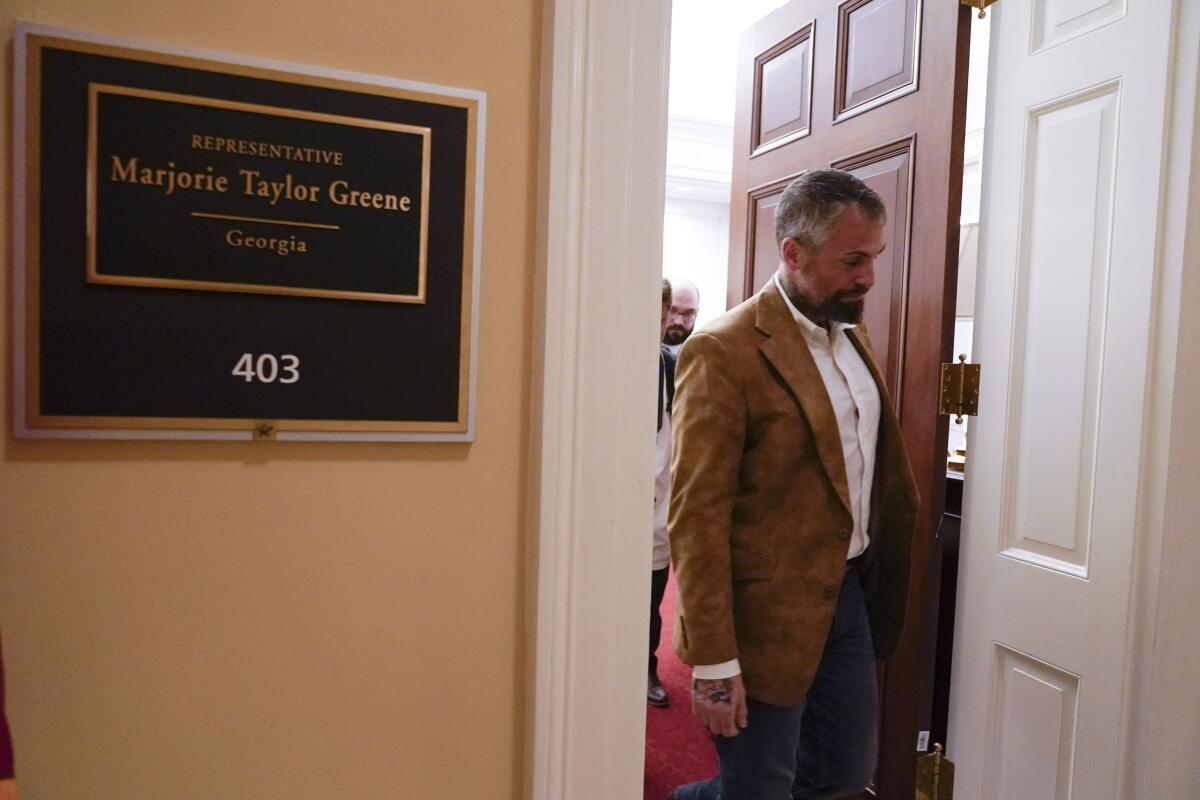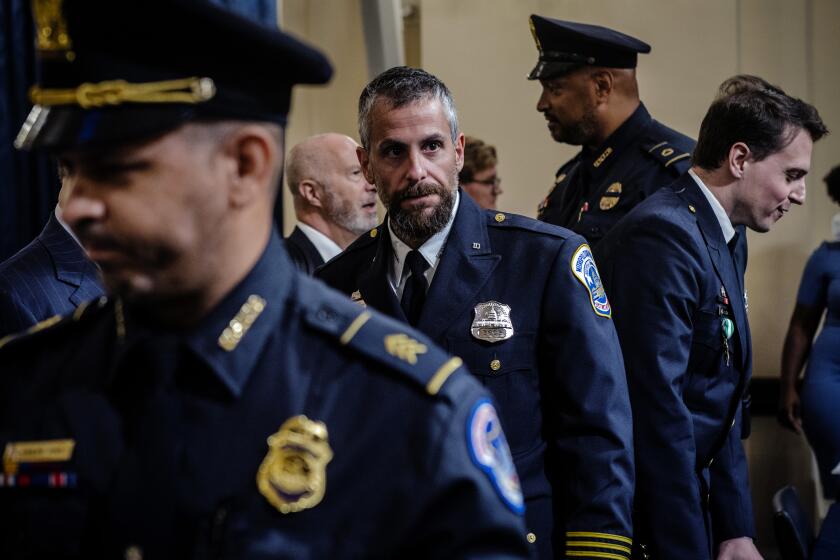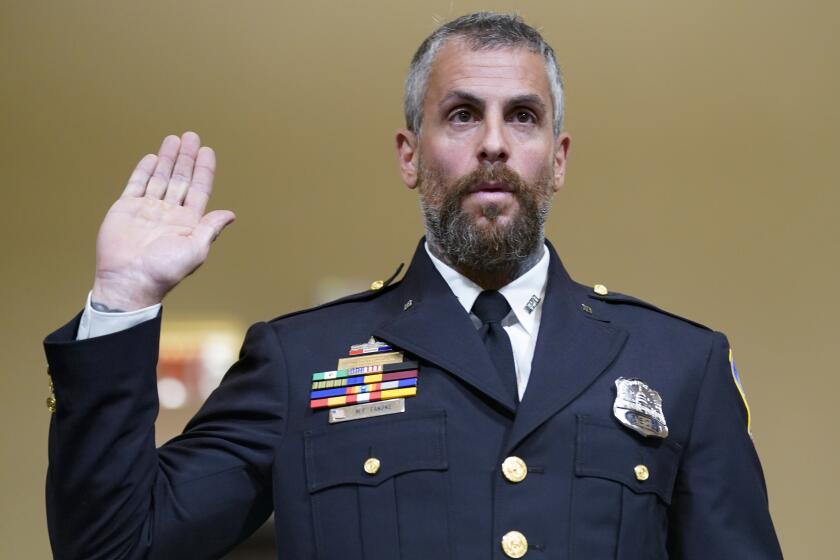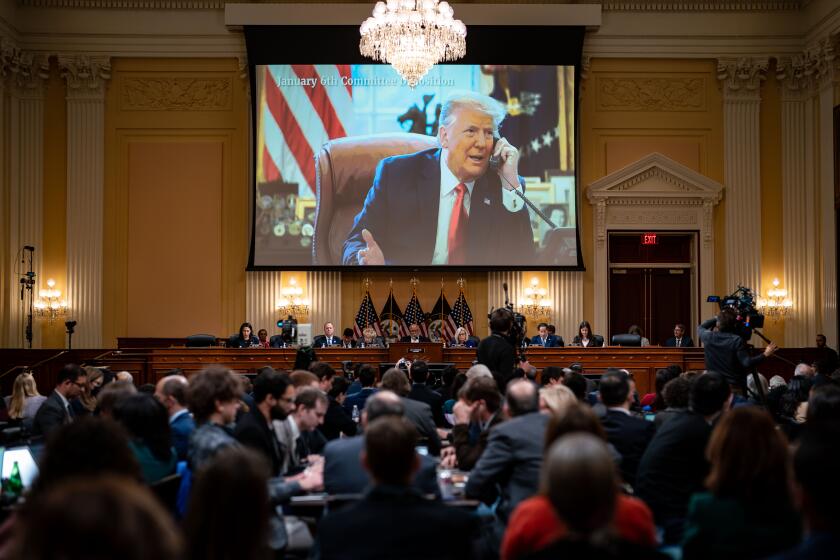Letters delivered by veterans urge House Republicans to condemn political violence

- Share via
WASHINGTON — Dozens of military veterans on Wednesday hand delivered letters to top Republicans in the U.S. House, calling on them to publicly condemn political violence as the second anniversary of the Jan. 6 attack on the Capitol approaches.
Former Metropolitan Police Officer Michael Fanone wrote the letter, which was signed by more than 1,000 military veterans, active duty members, law enforcement officers and military families. Fanone, who was beaten and shocked with stun guns during the attack on the Capitol, delivered a copy to Rep. Marjorie Taylor Greene’s office. While the GOP leadership remains unsettled, the groups behind the effort consider the Georgia representative one of the de facto leaders of the new Republican majority in the House.
Veterans also delivered letters to GOP Reps. James Comer of Kentucky, Jim Jordan of Ohio, Steve Scalise of Louisiana, Elise Stefanik of New York and Kevin McCarthy of Bakersfield, who is trying to become House speaker.
Wednesday’s visit to the Capitol was organized by the groups Common Defense and Courage for America to bring attention to violent rhetoric they say remains a threat to American democracy. They want top Republicans in the House not only to condemn political violence but to hold accountable those who spread violent and hate-filled messages.
The visits come at a tumultuous time on Capitol Hill. A core of conservative House Republicans has rejected McCarthy’s attempts to be elected speaker in multiple votes Tuesday and Wednesday. The GOP’s failure to elect a new speaker has put House business on hold, including the swearing in of its members and naming of committee chairs.
In the letter, Fanone calls on House Republicans to issue a public statement condemning all forms of political violence and “promise to hold members of your conference accountable for endorsing violence or espousing violent rhetoric towards those who disagree with them politically.”
Michael Fanone, who has left the force, was beaten by a pro-Trump mob. He discusses his recovery and the fallout from speaking out about Jan. 6.
The letter notes several incidents of politically motivated violence, including the attack on an FBI office in Ohio following the FBI search of former President Trump‘s Mar-a-Lago estate and the attack on the husband of former House Speaker Nancy Pelosi (D-San Francisco), as well as threats and comments calling for her execution.
Fanone was one of dozens of law enforcement officers injured during the Jan. 6, 2021, insurrection, when a mob marched to the Capitol at Trump’s urging and attacked it in an attempt to halt the certification of the 2020 presidential election. Fanone told the House committee that investigated the insurrection that the assault on him, which stopped only when he said he had children, caused him to have a heart attack.
In an interview, Fanone said he had been looking for an organization that expressed his values and concerns over the future of the country, and that led him to Courage for America, a progressive group created after Republicans won the House majority in November. Common Defense, a progressive grassroots organization of veterans, was formed during the 2016 election.
A Tennessee man who dragged a police officer into a mob, initiating one of the most harrowing acts of violence in the U.S. Capitol attack, is sentenced.
“I think we’re still in grave jeopardy,” Fanone said, despite this year’s midterm elections in which a number of Trump acolytes were rejected by voters. “I was like, yeah, democracy won — by a fraction of a percent in a lot of places.”
Although many candidates who denied the results of the 2020 presidential election were defeated, “a lot of those races were a hell of a lot closer than they should have been,” he said.
Lies about the 2020 election have spread widely and penetrated the Republican electorate. As recently as October, 58% of Republicans did not think President Biden’s election was legitimate, according to an AP-NORC Center for Public Affairs Research poll.
Veterans who have joined the groups share Fanone’s concerns about extremism in the U.S. and believe it creates a situation “that is really opposition to the oath that we took in enlisting in the military,” said Naveed Shah, an Army veteran who is the political director for Common Defense and spokesman for Courage for America.
The report by the House select committee probing the Jan. 6, 2021, attack on the Capitol provides a road map for potential criminal charges against Trump.
“The insurrection was neither the end nor the beginning of this kind of slow-moving coup,” he said. ”I’m not going to try predict what’s going to happen in the future, but what I can say is that you know political violence of all forms needs to be condemned.”
Once the groups finish in Washington, Shah said members will travel the country to talk to representatives in their districts about the need to condemn political violence and the language that stokes it.
Dozens of people charged in the Capitol attack have military backgrounds, including some associated with far-right extremist groups who are facing the most serious charges. Others arrested in the riot include an Army reservist who wore a Hitler mustache to his job at a Navy base and an active-duty Marine Corps officer seen on camera scuffling with police and helping other members of the pro-Trump mob force their way into the Capitol.
Alex Babcock, an Army veteran from Florida, started out as a Republican, but what he saw during the 2016 election — when Trump was claiming widespread fraud even before his victory over Hillary Clinton — led him to Common Defense.
He said veterans have a strong voice in defending American democracy because they have been willing to sacrifice their lives for it. He said it was important to call out politicians who try to cloak their messaging.
“There aren’t a lot of people that are outright saying, ‘I want to go hurt that guy,’” Babcock said. “But there are people who speak a language that is clear enough if you’re listening.”
More to Read
Sign up for Essential California
The most important California stories and recommendations in your inbox every morning.
You may occasionally receive promotional content from the Los Angeles Times.













